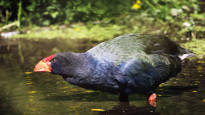The species population of the big-sultan chicken, which was rediscovered in 1948, is growing at an annual rate of about eight percent.
A new environmental protection milestone has been celebrated in New Zealand.
Last week, 18 takahea, or big sultan chickens, were released into the Lake Whakatipu Waimāori valley. They haven’t been seen in the area for a hundred years.
They talk about it, among other things The Guardian and BBC.
It is a large flightless bird that was declared extinct in 1898.
The species was rediscovered in 1948. Thanks to long-term conservation work, there are now about 500 individuals, and the population has grown at an annual rate of about eight percent.
The country aims to destroy all predatory mammals that have harmed the species
At first, the eggs of the great sultan chicken that were found were hatched artificially so that they would not end up as food for predators. The keepers fed and raised the hatched baby birds.
Later, the authority responsible for nature conservation in New Zealand began to look for separate wild areas for the species, from which pests harmful to the spread of large sultan chickens were removed.
The work done for the Great Sultanate chicken is part of a wider goal to return exotic birds to New Zealand. There is a national project underway in the country, which aims to eradicate all rats, ticks and foxes on the islands by 2050.
The carnivorous mammals that came with the Europeans at the time have greatly influenced the native species of the country. For example, several flightless bird species have become extinct because of them.
